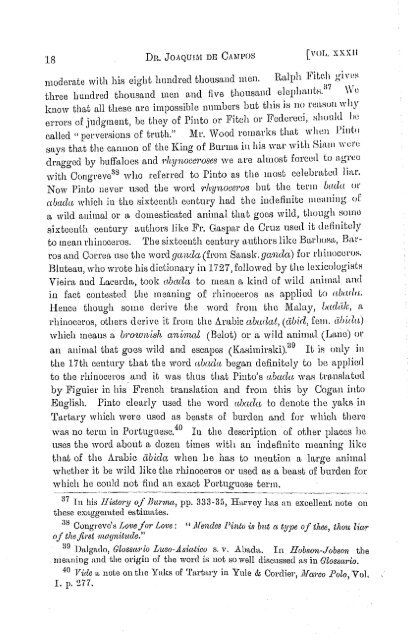The Journal of the Siam Society Vol. XXXII, 1940 - Khamkoo
The Journal of the Siam Society Vol. XXXII, 1940 - Khamkoo
The Journal of the Siam Society Vol. XXXII, 1940 - Khamkoo
Create successful ePaper yourself
Turn your PDF publications into a flip-book with our unique Google optimized e-Paper software.
18<br />
DR. JOAQUIM DE CAMPOS<br />
[VOL . .<strong>XXXII</strong><br />
moderate with his eight hundred thous11nd men. Ru,lplt Fitc·:h gin:fl<br />
three hundred thousand men and five thousand eleplmutH.' 17 Wu<br />
know that all <strong>the</strong>se arc impossible numbers but thiH i1:1 JI(J reaHon why<br />
errors <strong>of</strong>. judgment, be <strong>the</strong>y <strong>of</strong> Pinto or Fitch or Federeei, Hhonltl lw<br />
called "perversions <strong>of</strong> truth." Mr. Wood remarks tlu1t wlwn .Pinto<br />
says that <strong>the</strong> cannon <strong>of</strong> <strong>the</strong> King <strong>of</strong> Burma in his war with Sit1llt woru<br />
dmgged by huffaloes ancl?'hynoce?'OSes we are almost force1l to ngrce<br />
with Oono·L·eve 38 who referred to Pinto as <strong>the</strong> lllost celebmtml liM.<br />
0<br />
Now Pinto uever used <strong>the</strong> word rhynoce?'os but <strong>the</strong> term batlu or<br />
abctcho which in <strong>the</strong> sixteenth century had <strong>the</strong> indefinite meuuing <strong>of</strong><br />
a wild animal or 11 domesticated animal that goes wild, though smrw<br />
sixteenth century authors like Fr. Gaspar de Cruz used it ddinitely<br />
to mean rhinoceros. 'fhe sixteenth century authors like Bttrbosa, Barros<br />
nnd Onl'l'en, use <strong>the</strong> word ganda (from Sn,nsk. ganclct) for rhinoCOl'OH.<br />
Bluteau, who wrote his dictionary in 1727, followed by <strong>the</strong> lexicologisLH<br />
Vieim and Lacerda, took ctboila to mean a kind <strong>of</strong> wild nnim:tl !L]l(l<br />
in fa,cb contested <strong>the</strong> meaning <strong>of</strong> rhinoceros tts applied to u,barlu ..<br />
Hence though some derive <strong>the</strong> word feom <strong>the</strong> Malay, l!wlr'ilc, IL<br />
rhinoceros, o<strong>the</strong>rs derive it from <strong>the</strong> Arabic abwlat, (t""ibirl, fem. ilJII:rlu,)<br />
which means a u?'ownish animal (Belot) or 11 wild ttninml (Lane) ot'<br />
an animal that goes wild and escapes (KaHimirski).B 9 It iR only iu<br />
<strong>the</strong> 17th century that <strong>the</strong> vvord Ltbadct began definitely to he applied<br />
to <strong>the</strong> rhinocet·os and it was thus tlw,t Pinto's ctbacla, waR tntnslated<br />
by Figuier in his French translation and from this by Oogttll into<br />
English. Pinto clearly used <strong>the</strong> word ctbctclct to denote <strong>the</strong> yaks in<br />
'l\trtary which were used as beasts <strong>of</strong> burden and for which <strong>the</strong>l.'O<br />
was no term in Portuguese. 40 In <strong>the</strong> description <strong>of</strong> o<strong>the</strong>e places he<br />
uses <strong>the</strong> word about a dozen times with tl.n indefinite meaning like<br />
that <strong>of</strong> <strong>the</strong> Arabic cl.bicla when be has to mention a large animul<br />
whe<strong>the</strong>r it be wild like <strong>the</strong> rhinoceros Ol' used as a beast <strong>of</strong> bmden :for<br />
which he could not find an exact Portuguese term.<br />
il 7 In his llisto1·y <strong>of</strong> lhmnn, pp. 333-35, Harvey has an excellen~ no~~- ~;~<br />
<strong>the</strong>se exnggemted estiumtes.<br />
Bl:l Congrove' 8 Love fa?· Love : '' J1fencles Pinto ·is b1tt c~ type <strong>of</strong> <strong>the</strong>e thou licw<br />
<strong>of</strong> <strong>the</strong> first ·TIW.[Jn·itucle."<br />
'<br />
B 9 Dalgntlo, Glossnrio Luso-Asic~tico s. v. Abacht. In Hobson-Jobson <strong>the</strong><br />
menning and <strong>the</strong> origin <strong>of</strong> <strong>the</strong> word is not HOwell discussed ns in Glosscwio.<br />
40<br />
Yirle :t note on tho Yaks <strong>of</strong> Tart:wy in Ynle & Cordier, jJfct?·co Polo, <strong>Vol</strong>.<br />
I. p. '277.

















